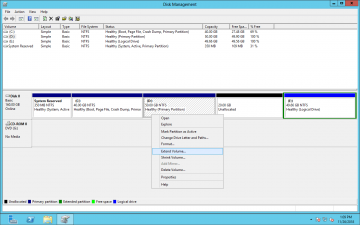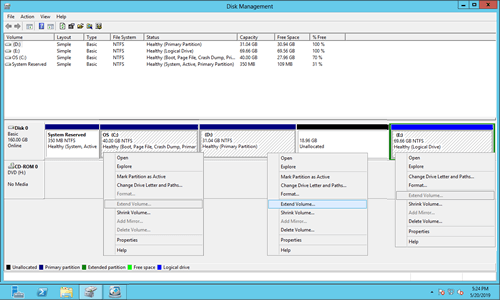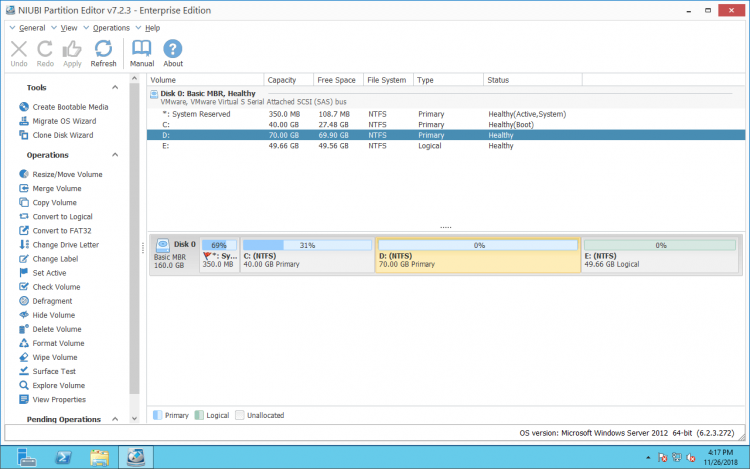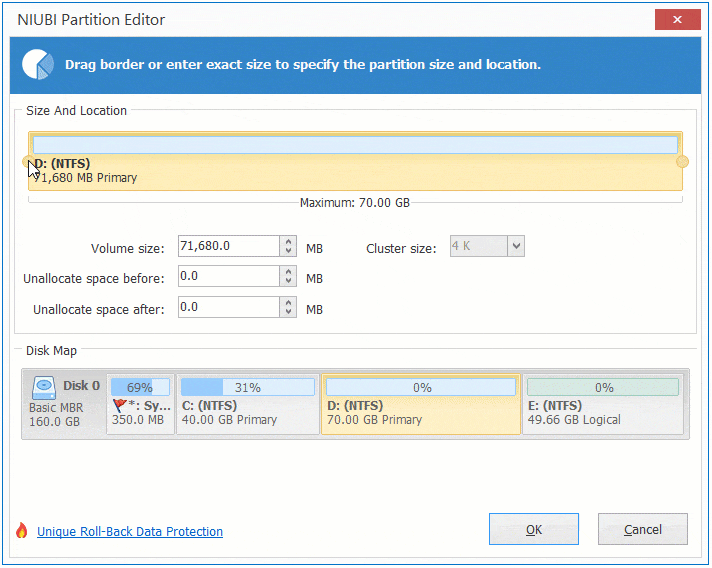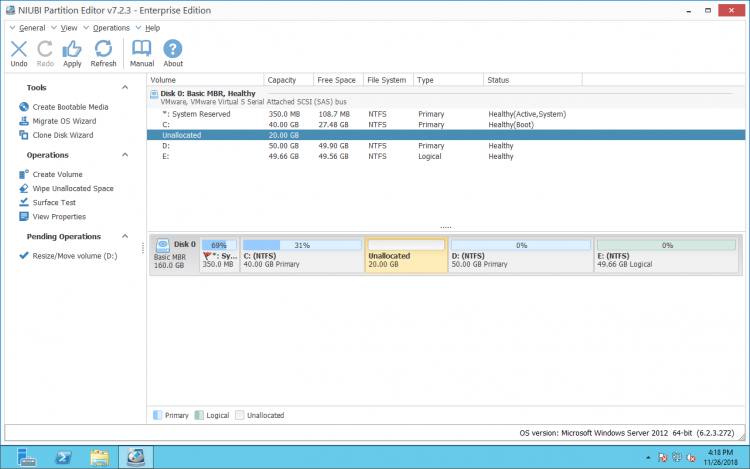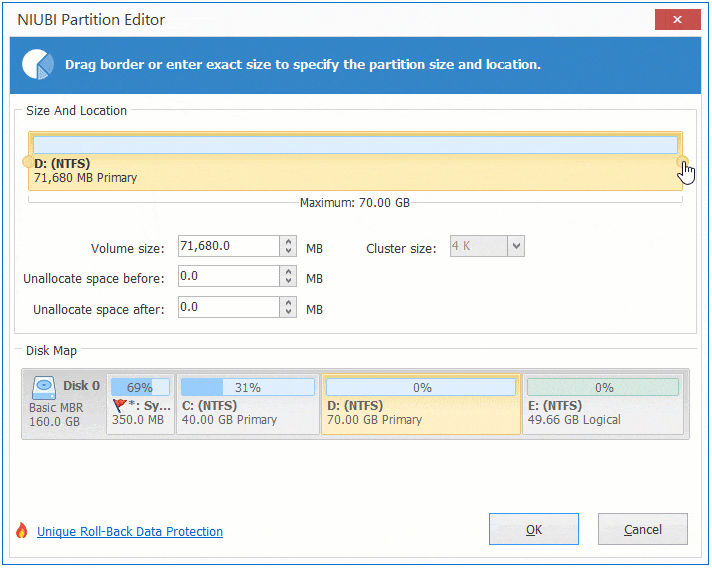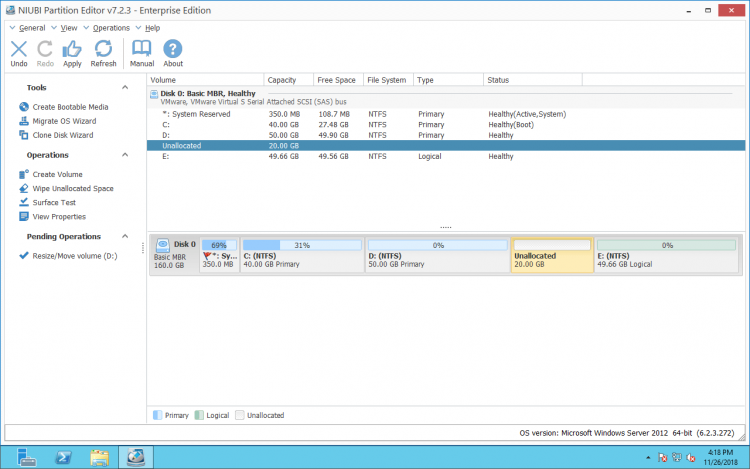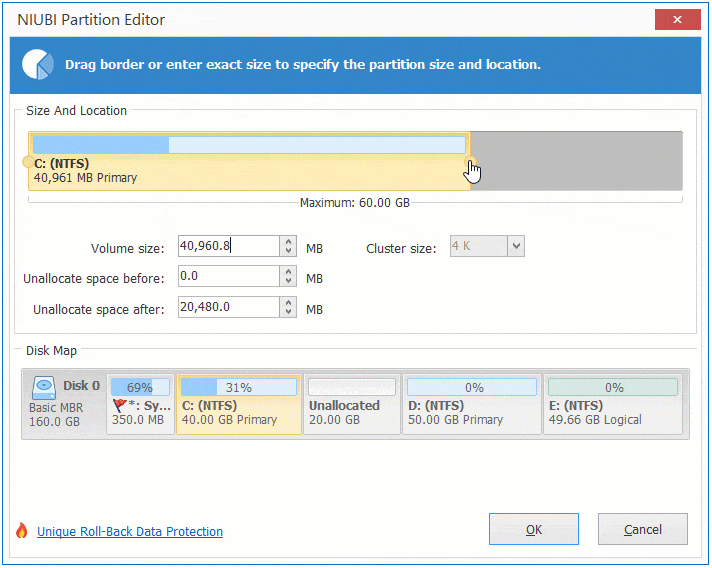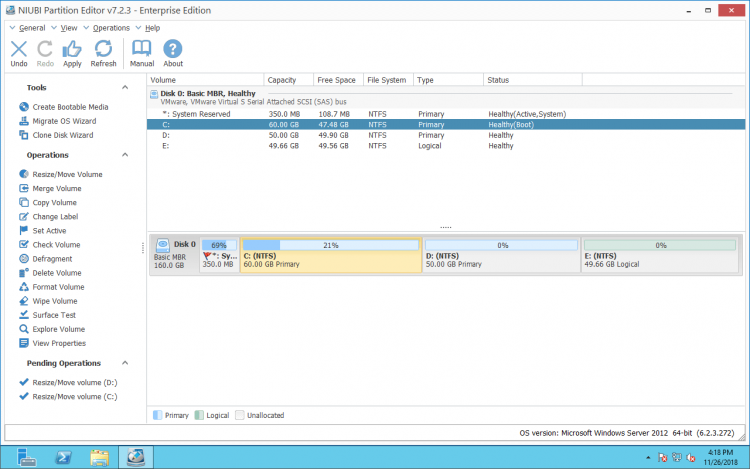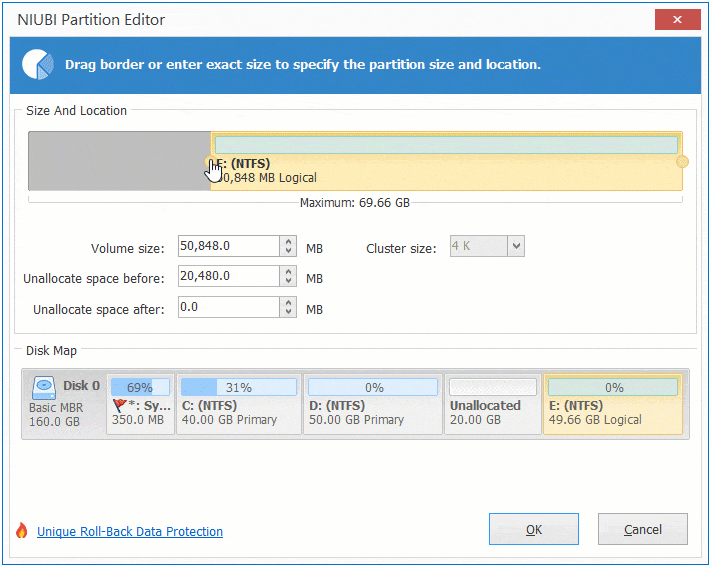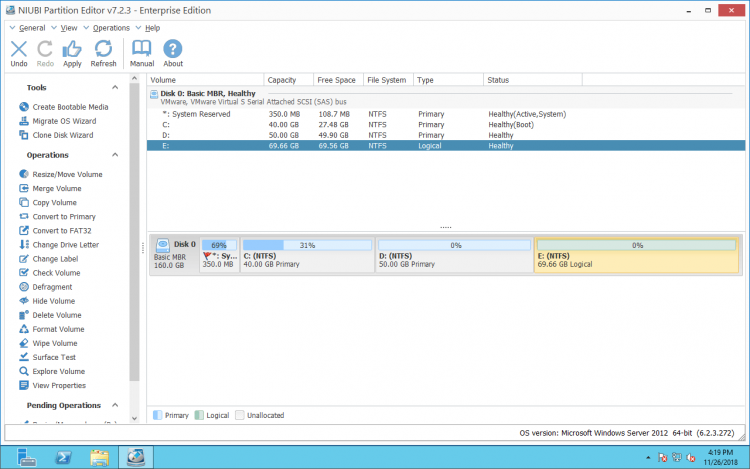Many server administrators need to repartition hard drive and extend system partition after running the server for a period of time, but it is not an easy task if you have no such experience before. Because there's potential system and partition damage risk, you'd better back up first and run safe partition tool for a server. Every Windows version has its native Disk Management tool, but because of many limitations it is not the best tool to help extend Server 2012 volume. This article introduces how to extend volume in Windows Server 2012 R2 with inbuilt Disk Management and safe partition software.
About Windows Server 2012 "Extend Volume" function
The same with previous version, Windows Server 2012 has built-in "Extend Volume" function in Disk Management. It can be used to expand both system partition and data volumes without losing data in most cases. However, it only works under specific condition. To extend volume with Server 2012 Disk Management, your disk partition configuration must meet the requirements:
- The partition that you want to extend must be formatted with NTFS file system.
- There is adjacent partition on the right of the drive that you want to extend.
- You must delete this adjacent partition to get contiguous unallocated space (for example, delete D to extend C).
- On MBR disk, the partitions that you want to delete and extend must be the same rimary or logical.
Many people may ask, there's another "Shrink Volume" function in Disk Management, why not extend partition by shrinking another one? Because this function can only shrink a volume towards left and make unallocated space on the right side. For example, after shrinking D: drive, unallocated space is on right of D, so it is nonadjacent to C drive. Therefore, Extend Volume is disabled for C drive.
How to extend volume with Server 2012 Disk Management
From the screenshot above, the 20GB unallocated space can only be extended to left adjacent drive D. If you want to extend C drive with Disk Management, the only option is by deleting D: drive to get adjacent unallocated space.
- Do not delete D if you installed programs or any Windows services in it.
- Remember to back up or transfer files before deleting this volume.
- D must be primary partition, otherwise, Disk Management still cannot extend C drive after deleting D.
Steps to extend volume in Windows Server 2012 R2 with Disk Management:
- Press Windows + X hotkey together and click Disk Management in the list.
- Right click the right contiguous partition (such as D:) and select Delete Volume.
- Right click the left partition that you want to expand (such as C:) and select Extend Volume.
- Simply click Next till Finish in the pop-up "Extend Volume Wizard" windows.
If you do not want to delete partition or the partition layout doen't meet the requirements above, server partition software is needed to extend volume in Windows Sever 2012 R2.
How to extend Server 2012 volume with safe partition software
Comparing with Windows Disk Management, NIUBI Partition Editor has many advantages such as:
- Overcome the restriction of FAT32 partition and logical/primary partitions.
- Make unallocated space on either left or right when shrinking a partition.
- Extend partition by merging either contiguous unallocated space by 1 step.
- Move unallocated space and combine to any nonadjacent partition on the same disk.
- Clone to a larger disk if there's no available free space in original disk.
- Much easier, just click, drag and drop on the disk map.
There's potential system damage and data loss risk while resizing disk partitions. If damage happens, you'll lose data or waste a long time to restore everything. Therefore, you'd better make a backup in advance and run safe partition software.
Better than other tools, NIUBI Partition Editor has powerful technologies to protect your system and data:
- Virtual mode - avoid incorrect operations by listing all as pending for preview, real disk partitions won't be changed until click "Apply" to confirm.
- Cancel-at-will - if you applied any wrong operations, you can cancel the ongoing operations without destroying partitions.
- 1 Second Rollback - if any error is detected while resizing and extending partition, it automatically reverts server to original status in a flash.
It doesn't require rebooting to clone disk partition with this tool. Therefore, you can clone system disk before any operations regularly. Whenever system disk goes wrong, you can boot from the clone disk immediately.
Download NIUBI Partition Editor, you'll see all disks with partition structure on the right, available operations are listed on the left and by right clicking.
How to extend volume in Server 2012 R2 with NIUBI Partition Editor:
① Right click drive D: and select Resize/Move Volume" to shrink it.
If you drag left border towards right, or enter an amount in the box of "Unallocated space before":
Then unallocated space will be made on the left side of D drive.
② Right click drive C: or E: and run "Resize/Move Volume" again to expand it.
To extend system drive C, drag right border towards right in the pop-up window.
Then unallocated space will be extended into C: drive.
③ Click Apply on top left to confirm and execute.
If you want to extend C drive by shrinking the non adjacent E, there's an additional step to move partition D to the right.
Watch the video how to extend volume in Windows Server 2012 R2:
How to extend RAID 1/5/6/10 partition for Server 2012
When shrinking and extending RAID partition in Windows Server 2012, do not break array no matter you use RAID 1, 5, 6, 10 or any other types. Do not do any operations to RAID controller, just follow the same steps above.
If there's no available free space on a physical disk or RAID 1, no software can extend a partition by adding free space from another separate disk. In that case, follow the step to clone disk to a larger one and extend partition with additional disk space.
How to extend virtual partition for VM in VMware/Hyper-V
If you run Windows Server 2012 as guest virtual machine in VMware or Hyper-V, there's also no difference to extend volume if you can get unallocated space on the same virtual disk.
If there's no available free space on a disk, you can expand this disk without copying to a larger one, follow the guide below:
After expanding disk, additional disk space will be shown as unallocated at the end of original disk. Follow the method in the video and combine unallocated space to other partitions.
Besides shrinking and extending volume in Windows Server 2012/2016/2019/2022 and previous Server 2003/2008, NIUBI Partition Editor helps you do many other disk partition management operations.

